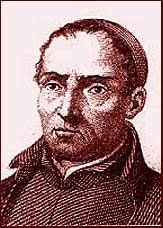
José Francisco de Isla
Encyclopedia

Spain
Spain , officially the Kingdom of Spain languages]] under the European Charter for Regional or Minority Languages. In each of these, Spain's official name is as follows:;;;;;;), is a country and member state of the European Union located in southwestern Europe on the Iberian Peninsula...
Jesuit, celebrated as a preacher and a humorist and satirist of the stamp of Cervantes
Cervantes
-People:*Alfonso J. Cervantes , mayor of St. Louis, Missouri*Francisco Cervantes de Salazar, 16th-century man of letters*Ignacio Cervantes, Cuban composer*Jorge Cervantes, a world-renowned expert on indoor, outdoor, and greenhouse cannabis cultivation...
.
Early career
He was born in Vidanes,León
León (province)
León is a province of northwestern Spain, in the northwestern part of the autonomous community of Castile and León.About one quarter of its population of 500,200 lives in the capital, León. The weather is cold and dry during the winter....
. His work Triunfo del amor y del la lealtad: dia grande de Navarra was a subtly satirical depiction of the celebrations held at Pamplona
Pamplona
Pamplona is the historial capital city of Navarre, in Spain, and of the former kingdom of Navarre.The city is famous worldwide for the San Fermín festival, from July 6 to 14, in which the running of the bulls is one of the main attractions...
to mark the visit of King Ferdinand VI. Initially, the book got an enthusiastic reception from some high-ranking readers - but a scandal broke out when on closer reading the real intent, biting and far from flattering, was revealed. De Isla was forced to leave his city and took up the life of an itinerant preacher
Preacher
Preacher is a term for someone who preaches sermons or gives homilies. A preacher is distinct from a theologian by focusing on the communication rather than the development of doctrine. Others see preaching and theology as being intertwined...
, where he gained considerable popularity.
It was during this time that his principal work, "Friar Gerund", was composed and published, in two parts (1758-1770 - originally under the name of his friend Don Francisco Lobon de Salazar, but de Isla's authorship of it was soon revealed. Historia del famoso predicador fray Gerundio de Campazas, alias Zotes, to cite the book's full name, depicted a peasant boy who rises to prominence as a preacher due to his smooth tongue. It constituted a biting satire on the charlatanism and bombast of the popular preaching friars of the day, as Don Quixote was on the false chivalry, and though in some ways overlong was seen as full of fresh humor.
Later life
The friars he satirised proved, however, too strong for de Isla. In 1760 the book was banned by the InquisitionInquisition
The Inquisition, Inquisitio Haereticae Pravitatis , was the "fight against heretics" by several institutions within the justice-system of the Roman Catholic Church. It started in the 12th century, with the introduction of torture in the persecution of heresy...
, which forbade not only its publication but also any discussion or debate of its contents, and in 1767 its author was expelled from Spain. Nevertheless, the book continued to be published in numerous clandestine editions, and is now considered a masterpiece of Spanish literature.
De Isla retired to Italy
Italy
Italy , officially the Italian Republic languages]] under the European Charter for Regional or Minority Languages. In each of these, Italy's official name is as follows:;;;;;;;;), is a unitary parliamentary republic in South-Central Europe. To the north it borders France, Switzerland, Austria and...
, and died at Bologna
Bologna
Bologna is the capital city of Emilia-Romagna, in the Po Valley of Northern Italy. The city lies between the Po River and the Apennine Mountains, more specifically, between the Reno River and the Savena River. Bologna is a lively and cosmopolitan Italian college city, with spectacular history,...
in extreme poverty. His last book, Cartas de Juan de la Encina, published posthumously (1784) constituted a sharp condemnation of the practices of the Spanish physicians of his time.

